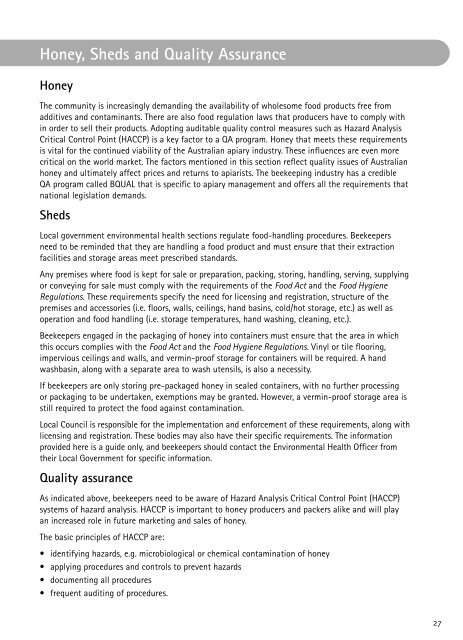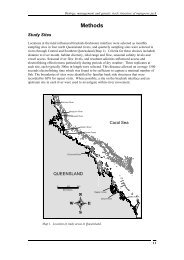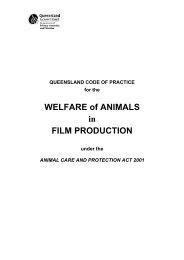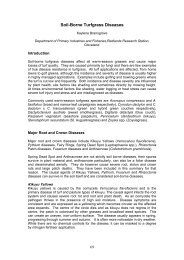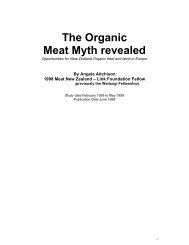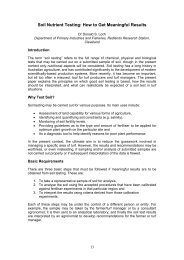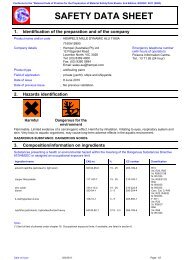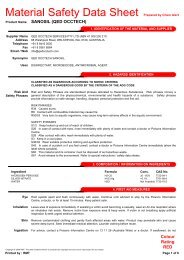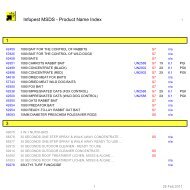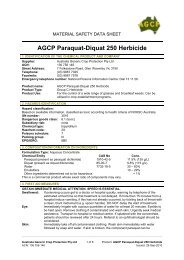Guidelines For Rural Beekeeping In Queensland
Guidelines For Rural Beekeeping In Queensland
Guidelines For Rural Beekeeping In Queensland
Create successful ePaper yourself
Turn your PDF publications into a flip-book with our unique Google optimized e-Paper software.
Honey, Sheds and Quality Assurance<br />
Honey<br />
The community is increasingly demanding the availability of wholesome food products free from<br />
additives and contaminants. There are also food regulation laws that producers have to comply with<br />
in order to sell their products. Adopting auditable quality control measures such as Hazard Analysis<br />
Critical Control Point (HACCP) is a key factor to a QA program. Honey that meets these requirements<br />
is vital for the continued viability of the Australian apiary industry. These influences are even more<br />
critical on the world market. The factors mentioned in this section reflect quality issues of Australian<br />
honey and ultimately affect prices and returns to apiarists. The beekeeping industry has a credible<br />
QA program called BQUAL that is specific to apiary management and offers all the requirements that<br />
national legislation demands.<br />
Sheds<br />
Local government environmental health sections regulate food-handling procedures. Beekeepers<br />
need to be reminded that they are handling a food product and must ensure that their extraction<br />
facilities and storage areas meet prescribed standards.<br />
Any premises where food is kept for sale or preparation, packing, storing, handling, serving, supplying<br />
or conveying for sale must comply with the requirements of the Food Act and the Food Hygiene<br />
Regulations. These requirements specify the need for licensing and registration, structure of the<br />
premises and accessories (i.e. floors, walls, ceilings, hand basins, cold/hot storage, etc.) as well as<br />
operation and food handling (i.e. storage temperatures, hand washing, cleaning, etc.).<br />
Beekeepers engaged in the packaging of honey into containers must ensure that the area in which<br />
this occurs complies with the Food Act and the Food Hygiene Regulations. Vinyl or tile flooring,<br />
impervious ceilings and walls, and vermin-proof storage for containers will be required. A hand<br />
washbasin, along with a separate area to wash utensils, is also a necessity.<br />
If beekeepers are only storing pre-packaged honey in sealed containers, with no further processing<br />
or packaging to be undertaken, exemptions may be granted. However, a vermin-proof storage area is<br />
still required to protect the food against contamination.<br />
Local Council is responsible for the implementation and enforcement of these requirements, along with<br />
licensing and registration. These bodies may also have their specific requirements. The information<br />
provided here is a guide only, and beekeepers should contact the Environmental Health Officer from<br />
their Local Government for specific information.<br />
Quality assurance<br />
As indicated above, beekeepers need to be aware of Hazard Analysis Critical Control Point (HACCP)<br />
systems of hazard analysis. HACCP is important to honey producers and packers alike and will play<br />
an increased role in future marketing and sales of honey.<br />
The basic principles of HACCP are:<br />
• identifying hazards, e.g. microbiological or chemical contamination of honey<br />
• applying procedures and controls to prevent hazards<br />
• documenting all procedures<br />
• frequent auditing of procedures.<br />
27


